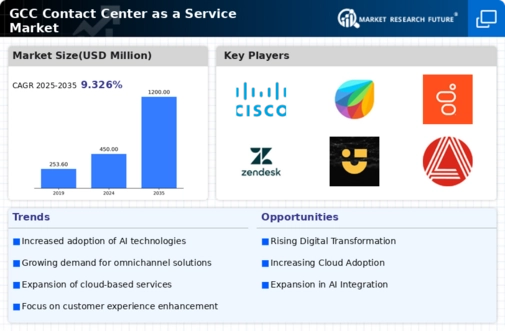Integration of Advanced Analytics
The integration of advanced analytics into the contact center-as-a-service market is becoming increasingly prevalent in the GCC. Organizations are leveraging data analytics to gain insights into customer behavior, preferences, and trends. This capability allows businesses to optimize their customer interactions and improve service delivery. Recent studies indicate that companies utilizing advanced analytics in their contact centers have seen a 20% increase in customer satisfaction scores. Furthermore, the ability to analyze large volumes of data in real-time enables organizations to make informed decisions quickly. As a result, the contact center-as-a-service market is likely to expand, driven by the demand for data-driven solutions that enhance customer engagement and operational efficiency.
Rising Focus on Customer Experience
In the GCC, there is a rising focus on enhancing customer experience, which is significantly impacting the contact center-as-a-service market. Businesses are increasingly prioritizing customer satisfaction as a key performance indicator, leading to investments in technologies that improve service quality. The market is witnessing a shift towards solutions that enable personalized interactions and faster response times. Data suggests that organizations that prioritize customer experience can achieve up to a 25% increase in customer retention rates. This trend indicates that the contact center-as-a-service market will continue to grow, as companies seek to implement innovative solutions that cater to the evolving expectations of their customers.
Growing Demand for Remote Work Solutions
The contact center-as-a-service market is experiencing a notable surge in demand for remote work solutions across the GCC region. Organizations are increasingly recognizing the need for flexible work environments, which has led to a shift towards cloud-based contact center solutions. This transition allows businesses to maintain operational efficiency while enabling employees to work from various locations. According to recent data, the adoption of remote work solutions in the GCC has increased by approximately 35% over the past year. This trend is likely to continue, as companies seek to enhance employee satisfaction and productivity. The contact center-as-a-service market is positioned to benefit from this growing demand, as it offers scalable and adaptable solutions that cater to the evolving needs of businesses in the region.
Expansion of E-commerce and Digital Services
The expansion of e-commerce and digital services in the GCC is significantly impacting the contact center-as-a-service market. As more consumers turn to online shopping and digital platforms, businesses are compelled to enhance their customer support capabilities. This trend has led to an increased demand for contact center solutions that can efficiently handle high volumes of inquiries across multiple channels. Recent data indicates that e-commerce sales in the GCC have grown by over 40% in the past year, highlighting the need for robust customer support systems. Consequently, the contact center-as-a-service market is poised for growth, as organizations seek to implement solutions that can effectively manage customer interactions in this rapidly evolving digital landscape.
Increased Regulatory Compliance Requirements
The contact center-as-a-service market in the GCC is also influenced by increased regulatory compliance requirements. Governments in the region are implementing stricter regulations regarding data protection and privacy, compelling organizations to adopt compliant solutions. This shift is driving demand for contact center services that ensure adherence to local laws and international standards. Companies that fail to comply with these regulations may face substantial penalties, which further emphasizes the need for reliable contact center solutions. As a result, the contact center-as-a-service market is likely to see growth as businesses invest in compliant technologies that safeguard customer data and enhance operational integrity.

















